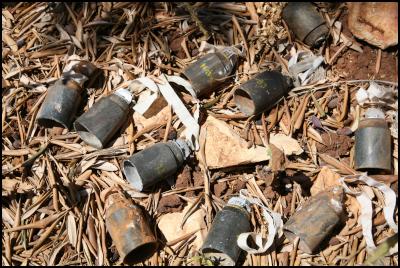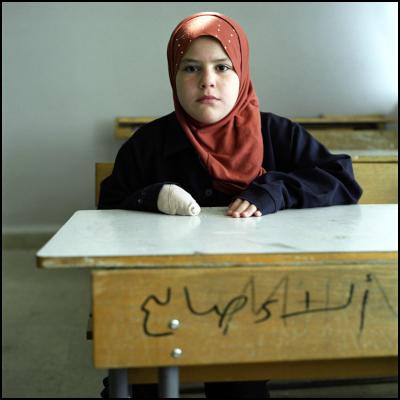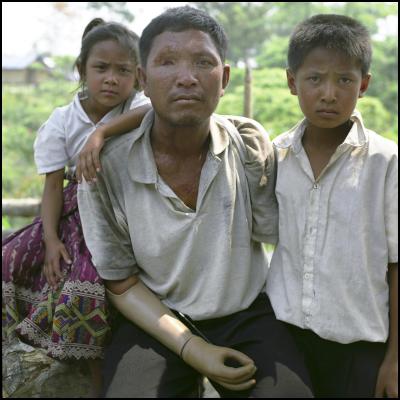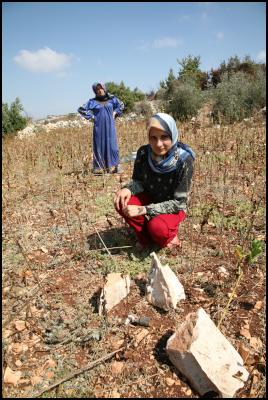Cluster Bomb Victims: Real-life stories
Cluster Bomb Victims: Real-life stories

Click to enlarge
Cluster bombs found in an olive grove in Southern Lebanon. CREDIT: Simon Conway/ Landmine Action
Real-life stories

Click to enlarge
Like many children, Zahra, 11, was attracted by the small size and curious shape of the cluster bomblet that injured her. The UN estimates that up to one million cluster bomblets, including those with self-destruct mechanisms, remained unexploded on the ground in Southern Lebanon after conflict ended in 2006. CREDIT: Alison Locke
1. Zahra Hussein Soufan, 12, Southern Lebanon
Zahra:
“My sister found it and gave it to me. As I took it from her it fell on the ground and when I picked it up it blew up and hurt my hand. I fell down on the ground and my friends carried me home.
“My mum took me to the doctor and he said my hand had to be cut off. My mum started crying so they took me to the hospital and did an operation.
“It was very loud when it went off. It burst my ears. I couldn’t hear much afterwards. My sister was with me. She got shrapnel in her finger and she couldn’t hear.
“It hurts a lot and it always feels cold. I keep having to warm it up.
“I can’t play. I don’t go out. I used to have fun with my friends. But I can’t play with them anymore. They keep teasing me about my fingers and they tease me about my thumb – that it won’t grow back.
I just want my thumb to grow back and my hand to be ok. That’s all.”
Jwaia, Zahra’s mother:
“It was the middle of Ramadan and we were having our evening meal. My daughter was going out afterwards to a religious recital. Just after she left we heard a loud bang. Her sister had gone out to play and found something like a toy in the tangerine orchard.
Zahra said it was shaped like a colouring box with a kind of pyramid on top. As soon as she picked it up it exploded and blew her thumb off.
Our neighbour picked it Zahra’s thumb up in a handkerchief and brought it to us. We thought maybe it could be saved if they re-attached it straight away.”

Click to enlarge
Dtar lost both his arms after finding a cluster bomblet while fishing with his sons in Laos. Thousands of people worldwide have been permanently disabled or killed by cluster bombs, either during attacks or in the years afterwards. CREDIT: Alison Locke
2. Dtar, Laos,
“One day in 2003 I took my two boys down to the river to go fishing. I found a cluster bomb in the water and picked it up because I wanted to use it as an explosive, to blow up in the river so that we could catch more fish. But it went off in my hands and blew off my arms.
“Now we are getting poorer because I lost both my arms and I can’t work to support my family.
“I’m lucky at least, because they sorted me out with one artificial arm. My right arm was blown right off by the explosion and they had to amputate my left arm twice, because it was infected after the first amputation, so they had to cut it off higher up.
“The bomb also blew up right in my face and eyes. I couldn’t see anything. My sight was blurry until I went to hospital again in 2005, when my relatives had saved up enough money again to pay for the operation.
“My wife and the family earn all the money to support us now. One of my sons had to leave school so that he could help my wife. He’s only 15. I help as I can. I look after the vegetables and sweep the house. I help my wife in the fields a bit but I am not much use.”

Click to enlarge
Fatimah and Safia Hussein’s family have been living off tobacco and olive cultivation for decades. Three days of cluster bombardment during the 2006 conflict in Southern Lebanon has left their crops littered with hundreds of unexploded cluster bombs. Their livelihood has been destroyed. CREDIT: Simon Conway/ Landmine Action
3. Fatimah, 37 and Safia, 23, Southern Lebanon
Safia and Fatimah Hussein’s village was subject to heavy cluster bomb bombardment during the last 72 hours of conflict in Southern Lebanon.
While the cluster bombs have been cleared from inside their house, their olive groves and tobacco crops are littered with hundreds of unexploded cluster bomblets.
Safia:
“It was horrible for us, during the war we used to go out and gather drinking water from the well and people from nearby would also go and get food for us. But after the cluster bombardment I could not go outside for three days because bomblets were everywhere.
“When they were firing the cluster bombs I felt like the house would drop. Many bomblets burst through the wall and came into the house and I started to panic. The attacks lasted for one and a half hours and then they cooled down for one hour and then they started again.
“I heard the sound of each cluster bomb shell for five minutes, like popcorn. We never saw any military activity in this area. We were the targets, the civilians.
“We had no water for one and a half days until Hezbollah came to clear so we could get access to water and food. Then after Hezbollah the army came to continue clearing roads and houses. But you see we still have so many bomblets here in our fields.
“I am training to be a nurse at college, but I have had to take leave from my studies to help my mother pick what little remains of the tobacco crop. My brothers are too young to understand the threat from the unexploded submunitions so they are not allowed to help pick the remaining crop.”
Fatimah:
“We have lost our tobacco season and our olive season. We have been harvesting tobacco and growing olives from this land for our whole lives. Now because of the war and the cluster munitions we have lost everything.
“We cannot plough our land and we cannot plant seeds for the winter.”
ENDS


 Gordon Campbell: On The Trump Upside, And Peters Persecution Of Trans People
Gordon Campbell: On The Trump Upside, And Peters Persecution Of Trans People Save the City-to-Sea Bridge: Join on Sunday afternoon to save Wellington’s City-to-Sea Bridge
Save the City-to-Sea Bridge: Join on Sunday afternoon to save Wellington’s City-to-Sea Bridge New Zealand Defence Force: Second World War Veterans Receive Message From King Charles
New Zealand Defence Force: Second World War Veterans Receive Message From King Charles New Zealand Government: More Than 900 Health Graduates To Receive Financial Boost Through Bonding Scheme
New Zealand Government: More Than 900 Health Graduates To Receive Financial Boost Through Bonding Scheme New Zealand Police: Stacks Of Cocaine Unpacked In Mt Wellington
New Zealand Police: Stacks Of Cocaine Unpacked In Mt Wellington Te Pāti Māori: Te Pāti Māori Make Submission To Privileges Committee In Absentia
Te Pāti Māori: Te Pāti Māori Make Submission To Privileges Committee In Absentia PSA: PSA Forces Changes To Restructure Of Data & Digital And Pacific Health
PSA: PSA Forces Changes To Restructure Of Data & Digital And Pacific Health


